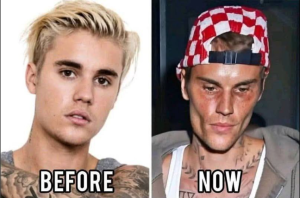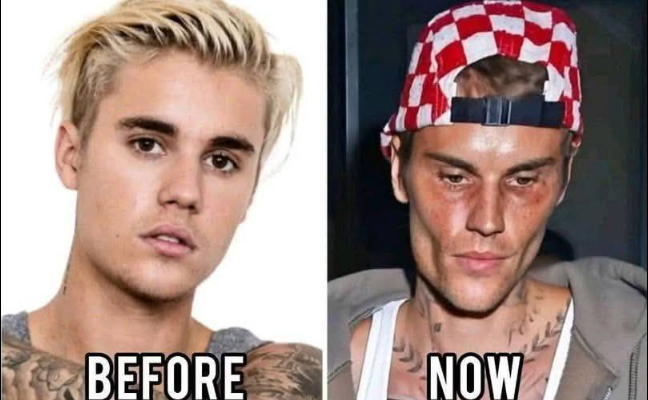🥺 “Justin Bieber Admits He Tested Positive For…” — How a Viral Headline Sparked Global Panic
The internet froze for a moment when a heartbreaking headline began circulating across social media platforms: “🥺 Justin Bieber admits that he tested positive for…” The sentence stopped short, cut off by a familiar prompt — “See More.” In seconds, fans flooded comment sections with shock, fear, and heartbreak. Had the pop superstar revealed devastating news? Was his health worsening? Or was the headline something far less concrete than it appeared?
As it turns out, the story behind the headline says more about modern digital culture than about Justin Bieber himself.
The Power of an Unfinished Sentence
In today’s attention economy, incomplete headlines are powerful. By withholding a key detail, they trigger curiosity, fear, and emotional urgency. In Justin Bieber’s case, this tactic was especially effective because of his well-documented health struggles over the past several years.
Fans immediately began speculating:
-
COVID-19?
-
A chronic illness?
-
A relapse?
-
A new neurological condition?
Within hours, the phrase had been shared thousands of times — often without any accompanying article, quote, or verified source.
What Justin Bieber Has Actually Shared About His Health
Justin Bieber has been unusually open about his health journey, especially since 2020. In the past, he has publicly confirmed diagnoses that were medically verified and responsibly disclosed, including:
-
Lyme disease, which he revealed after months of speculation about his appearance and energy levels.
-
Ramsay Hunt syndrome, announced in 2022 after facial paralysis forced him to cancel tour dates.
-
Mental health struggles, including anxiety and depression, which he has spoken about candidly.
Each of these disclosures came directly from Justin, often through personal videos or official statements — not vague viral captions.
That distinction matters.
The Problem With “Tested Positive” Clickbait
The phrase “tested positive” implies a medical result, but without naming the condition, it becomes a blank canvas for fear. In this case, no verified interview, medical update, or statement exists in which Justin Bieber recently said he tested positive for a new illness.
What circulated instead was:
-
Edited clips taken out of context
-
Old interviews resurfaced without dates
-
Social media posts that blurred speculation with fact
Once released, these fragments took on a life of their own.
Why Fans Reacted So Emotionally
Justin Bieber isn’t just a celebrity — for many, he represents:
-
A childhood soundtrack
-
A shared coming-of-age experience
-
A symbol of vulnerability in fame
His openness about suffering made fans feel protective. So when a headline hinted at new bad news, the emotional response was immediate and intense.
Comments ranged from:
-
“Please let this not be serious”
-
“He’s been through enough”
-
“Why is no one explaining what this means?”
But explanation was exactly what the headline avoided.
The Reality: No New Diagnosis Has Been Confirmed
As of now:
-
Justin Bieber has not publicly announced testing positive for any new condition
-
No medical update has been confirmed by his team
-
No reputable outlet has published a verified report
That doesn’t mean his health journey is over — but it does mean the viral headline overstated reality.
Why This Keeps Happening to Celebrities
Health-related misinformation spreads faster than almost any other type of rumor, especially when it involves:
-
Illness
-
Vulnerability
-
Beloved public figures
Algorithms reward engagement, not accuracy. An emotional half-sentence can outperform a carefully sourced article — and that’s exactly what happened here.
Justin Bieber’s Ongoing Focus
In recent months, Justin has emphasized:
-
Stepping back from constant public scrutiny
-
Prioritizing rest and recovery
-
Focusing on faith, marriage, and balance
He has not hinted at any alarming new diagnosis.
A Lesson in Digital Compassion
This moment is a reminder that real people live behind viral headlines. Health is not content. Speculation can cause unnecessary distress — not just to fans, but to the individuals at the center of the rumor.
Before sharing, reacting, or panicking, it’s worth asking:
-
Who confirmed this?
-
When was this said?
-
Is the full statement available?
Final Thoughts
The phrase “Justin Bieber admits he tested positive for…” captured attention — but left out the truth. Right now, there is no verified medical bombshell, only a familiar cycle of speculation fueled by incomplete information.
Justin Bieber remains a public figure who has earned respect for his honesty — and when he has something important to share, history shows he will do so clearly, directly, and responsibly.
Until then, the most powerful response isn’t panic — it’s patience.


